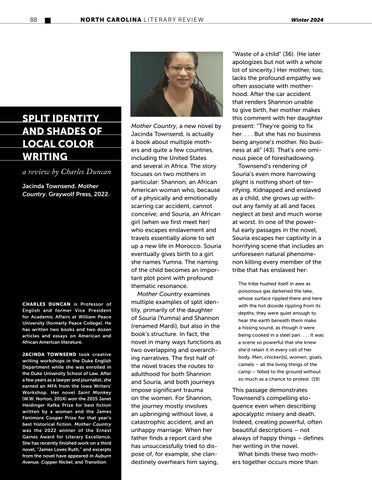88
NORTH CAROLINA L I T E R A R Y RE V I E W
SPLIT IDENTITY AND SHADES OF LOCAL COLOR WRITING a review by Charles Duncan Jacinda Townsend. Mother Country. Graywolf Press, 2022.
CHARLES DUNCAN is Professor of English and former Vice President for Academic Affairs at William Peace University (formerly Peace College). He has written two books and two dozen articles and essays on American and African American literature. JACINDA TOWNSEND took creative writing workshops in the Duke English Department while she was enrolled in the Duke University School of Law. After a few years as a lawyer and journalist, she earned an MFA from the Iowa Writers’ Workshop. Her novel Saint Monkey (W.W. Norton, 2014) won the 2015 Janet Heidinger Kafka Prize for best fiction written by a woman and the James Fenimore Cooper Prize for that year’s best historical fiction. Mother Country was the 2022 winner of the Ernest Gaines Award for Literary Excellence. She has recently finished work on a third novel, “James Loves Ruth,” and excerpts from the novel have appeared in Auburn Avenue, Copper Nickel, and Transition.
Mother Country, a new novel by Jacinda Townsend, is actually a book about multiple mothers and quite a few countries, including the United States and several in Africa. The story focuses on two mothers in particular: Shannon, an African American woman who, because of a physically and emotionally scarring car accident, cannot conceive; and Souria, an African girl (when we first meet her) who escapes enslavement and travels essentially alone to set up a new life in Morocco. Souria eventually gives birth to a girl she names Yumna. The naming of the child becomes an important plot point with profound thematic resonance. Mother Country examines multiple examples of split identity, primarily of the daughter of Souria (Yumna) and Shannon (renamed Mardi), but also in the book’s structure. In fact, the novel in many ways functions as two overlapping and overarching narratives. The first half of the novel traces the routes to adulthood for both Shannon and Souria, and both journeys impose significant trauma on the women. For Shannon, the journey mostly involves an upbringing without love, a catastrophic accident, and an unhappy marriage. When her father finds a report card she has unsuccessfully tried to dispose of, for example, she clandestinely overhears him saying,
Winter 2024
“Waste of a child” (36). (He later apologizes but not with a whole lot of sincerity.) Her mother, too, lacks the profound empathy we often associate with motherhood. After the car accident that renders Shannon unable to give birth, her mother makes this comment with her daughter present: “They’re going to fix her. . . . But she has no business being anyone’s mother. No business at all” (43). That’s one ominous piece of foreshadowing. Townsend’s rendering of Souria’s even more harrowing plight is nothing short of terrifying. Kidnapped and enslaved as a child, she grows up without any family at all and faces neglect at best and much worse at worst. In one of the powerful early passages in the novel, Souria escapes her captivity in a horrifying scene that includes an unforeseen natural phenomenon killing every member of the tribe that has enslaved her: The tribe hushed itself in awe as poisonous gas darkened the lake, whose surface rippled there and here with the hot dioxide rippling from its depths; they were quiet enough to hear the earth beneath them make a hissing sound, as though it were being cooked in a steel pan. . . . It was a scene so powerful that she knew she’d retain it in every cell of her body. Men, chicken[s], women, goats, camels – all the living things of the camp – felled to the ground without so much as a chance to protest. (19)
This passage demonstrates Townsend’s compelling eloquence even when describing apocalyptic misery and death. Indeed, creating powerful, often beautiful descriptions – not always of happy things – defines her writing in the novel. What binds these two mothers together occurs more than
